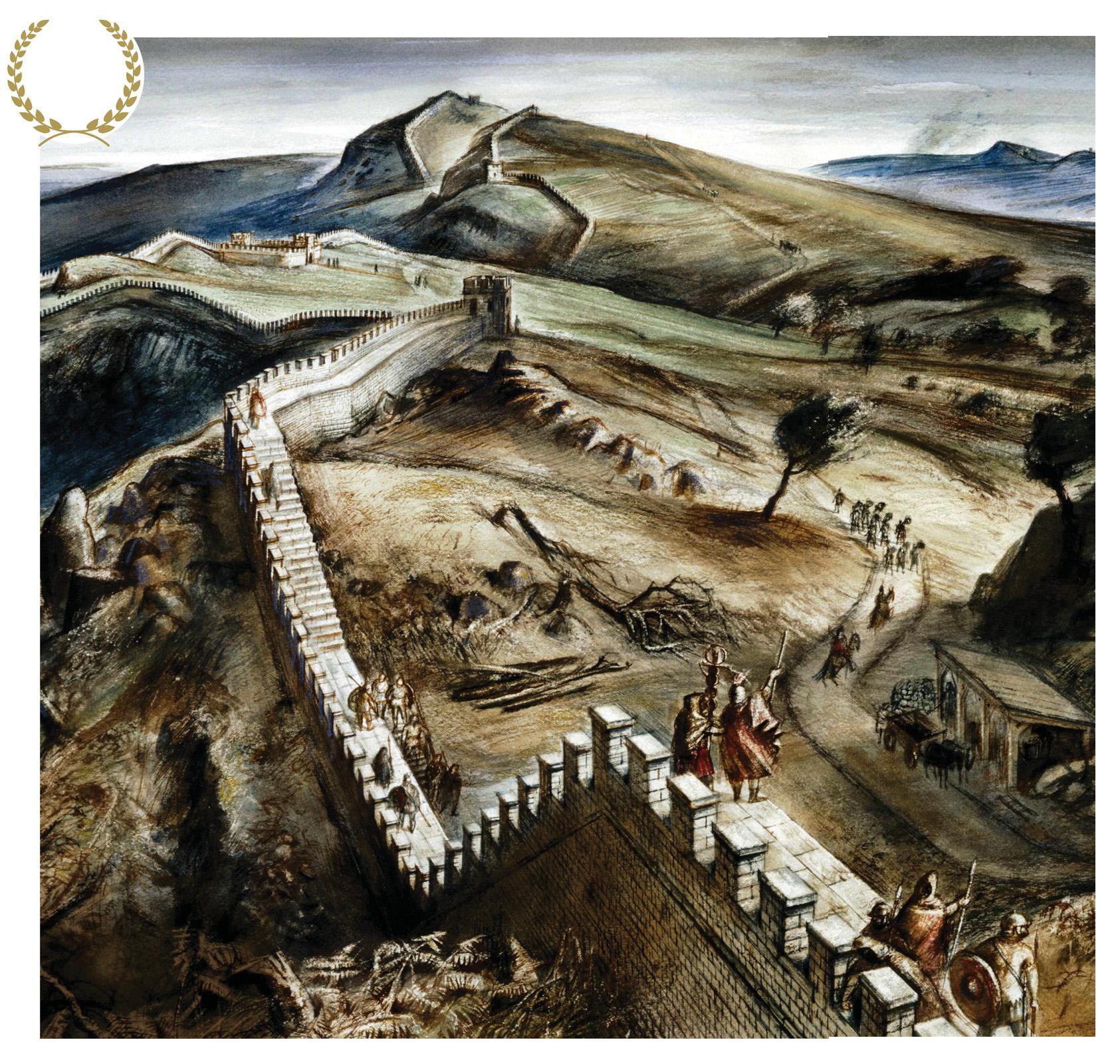Prøve GULL - Gratis
FRONTIER TOURISTS
BBC History UK
|August 2022
Since its earliest days, the great barrier at the Roman empire's north-western edge has been a source of wonder. Rob Collins traces the history of tourism and souvenirs at Hadrian's Wall

On a June day in 2003, metal detectorists in the north Staffordshire village of Ilam unearthed a curious object. The second-century AD trulla – a small saucepan – is made of a copper alloy, inlaid with colourful, slightly psychedelic enamel whirls. What makes the artefact, now known as the Staffordshire Moorlands Pan (or Ilam Pan), special, though, is the Latin inscription running around its rim: MAIS COGGABATA VXELODVNVM CAMMOGLANNA RIGORE VALI AELI DRACONIS.
What does it mean? Well, the first four words are names of Roman forts in Cumbria: Mais (at Bowness-on-Solway), Coggabata (Drumburgh), Uxelodunum (Stanwix) and Cammoglanna (Castlesteads). The second part of the inscription – RIGORE VALI AELI DRACONIS – can be translated as: “Along the line of Hadrian’s Wall, [this is the cup of] Draco.” If that interpretation is correct, then this is a vessel commissioned by Draco to commemorate his time at these forts – in other words, a souvenir of Hadrian’s Wall. And it’s not the only one – other pans found elsewhere in Britain and France also reference forts on the wall. So how did a Roman military monument come to inspire such keepsakes?
Desirable souvenirs
The construction of Hadrian’s Wall was unprecedented. It was – and in many ways remains – a unique creation. Once completed, the wall was garrisoned for nearly 300 years, during which time tens of thousands of Roman soldiers served along the monument.
Denne historien er fra August 2022-utgaven av BBC History UK.
Abonner på Magzter GOLD for å få tilgang til tusenvis av kuraterte premiumhistorier og over 9000 magasiner og aviser.
Allerede abonnent? Logg på
FLERE HISTORIER FRA BBC History UK
BBC History UK
Royal progress
Alice Loxton's new book begins with a compelling premise.
1 mins
January 2026

BBC History UK
"Leaving Muslim contributions out of European history has allowed Islamophobic sentiment to flourish"
THARIK HUSSAIN speaks to Danny Bird about the long but often overlooked and distorted history of Muslims in Europe - and the enduring resistance to its reappraisal
9 mins
January 2026

BBC History UK
7 UNMISSABLE TRIPS IN 2026
With new routes, big anniversaries and fresh ways of discovering familiar favourites, TOM HALL highlights historical destinations to explore this year
4 mins
January 2026

BBC History UK
SOPHIE SCHOLL
Novelist Simon Scarrow chooses
2 mins
January 2026
BBC History UK
Portrait of the artists
TRACY BORMAN is enraptured by a beautifully written and richly illustrated exploration of early modern English art
2 mins
January 2026

BBC History UK
Humble heroes
Statues celebrate monarchs, rulers and conquerors - but who remembers the brave folk who gave their lives to save others? Anna Maria Barry recounts stories of selfsacrificing but otherwise ordinary people from the 19th and 20th centuries who are commemorated in one London park.
9 mins
January 2026

BBC History UK
BACK FROM THE DEAD
Britain’s War Office thanked the SAS for its remarkable efforts in WW2 by abolishing it – yet soon realised the error of its ways. Gavin Mortimer tells the story of how the elite unit reinvented itself to confront the challenges of the postwar world
8 mins
January 2026

BBC History UK
Q&A - A selection of historical conundrums answered by experts
Were Roman gladiators vegetarian?
8 mins
January 2026
BBC History UK
Martha McGill on a pioneering study of folk beliefs in early modern England
I was recently chatting with a handful of early modernists about the history book we'd take to a desert island.
1 min
January 2026

BBC History UK
Independent empires
Viewing the British empire through an American lens provides an intriguing alternative perspective on the 'Land of the Free', says DAVID ARMITAGE
4 mins
January 2026
Translate
Change font size
